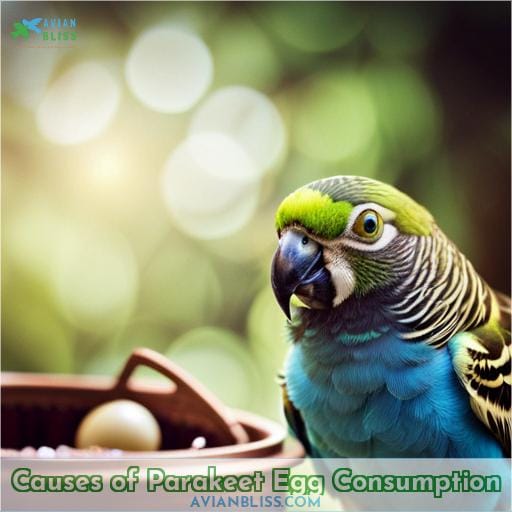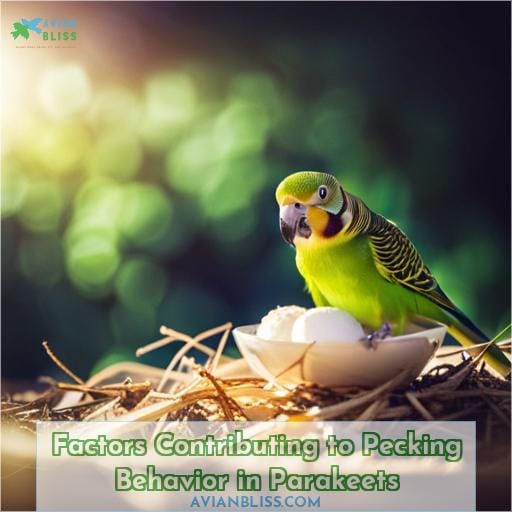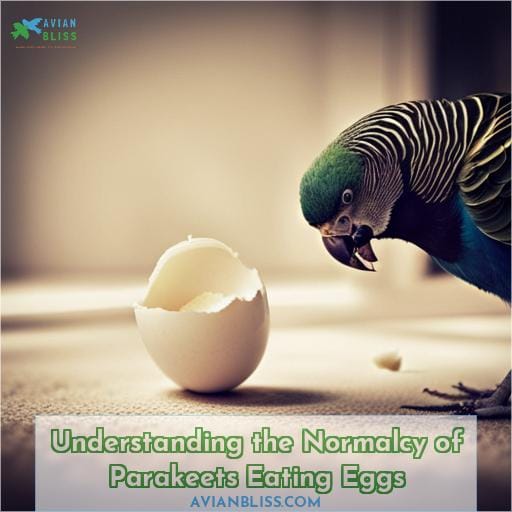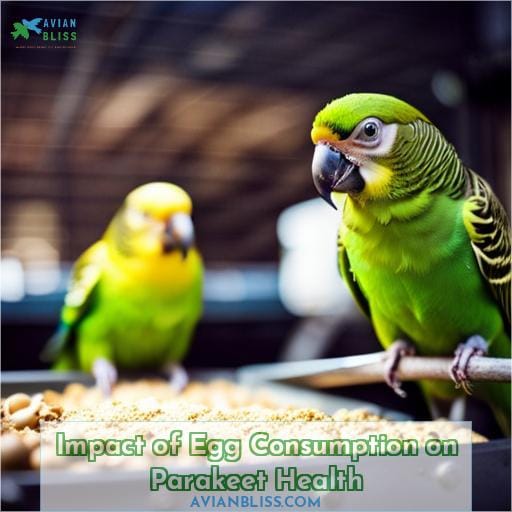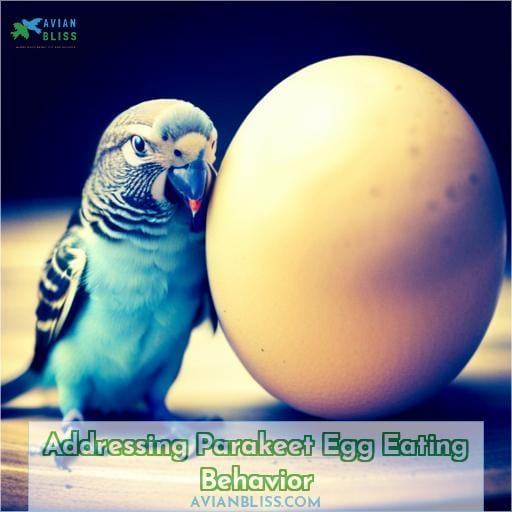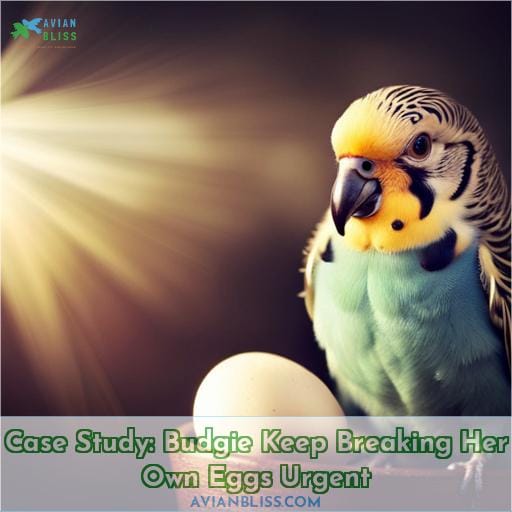This site is supported by our readers. We may earn a commission, at no cost to you, if you purchase through links.
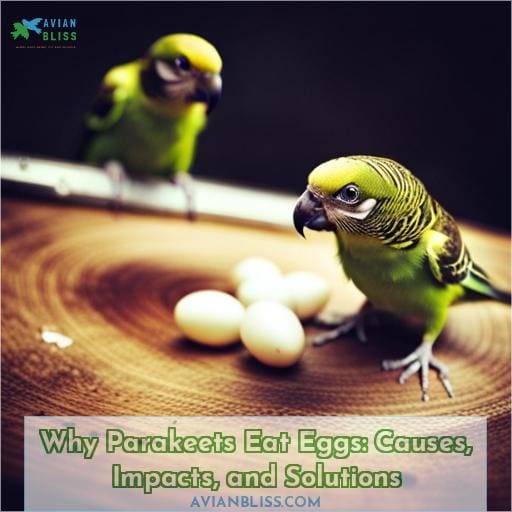 Imagine witnessing a fascinating yet puzzling behavior in your parakeet: eating their own eggs. You may be wondering why they engage in this seemingly counterproductive act. Well, here’s an interesting statistic for you: nearly 20% of parakeets exhibit egg consumption behavior.
Imagine witnessing a fascinating yet puzzling behavior in your parakeet: eating their own eggs. You may be wondering why they engage in this seemingly counterproductive act. Well, here’s an interesting statistic for you: nearly 20% of parakeets exhibit egg consumption behavior.
But fear not! In this article, we will delve into the causes behind this phenomenon, its impact on their health, and most importantly, provide solutions to help you address and prevent it from happening again in the future.
Table Of Contents
- Key Takeaways
- Causes of Parakeet Egg Consumption
- Factors Contributing to Pecking Behavior in Parakeets
- Understanding the Normalcy of Parakeets Eating Eggs
- Impact of Egg Consumption on Parakeet Health
- Addressing Parakeet Egg Eating Behavior
- Case Study: Budgie Keep Breaking Her Own Eggs Urgent
- Frequently Asked Questions (FAQs)
- What are some common signs that a parakeet may be about to eat its own eggs?
- Are there any safe and effective methods to discourage parakeets from eating their eggs?
- Can a parakeet’s diet alone prevent them from eating their eggs?
- How long should a breeding pair be rested before attempting to breed again after egg-eating behavior?
- Are there any long-term consequences for parakeets that consistently eat their own eggs?
- Conclusion
Key Takeaways
- Nutritional deficiency and breeding conditions can contribute to parakeets eating their eggs.
- Boredom and lone female behavior may also lead to egg consumption.
- While unlikely to cause illness, egg-eating behavior is considered aberrant and may have potential harm.
- Prevention strategies include identifying the root cause, making nutritional adjustments, providing environmental enhancements, and offering socialization opportunities in a safe environment.
Causes of Parakeet Egg Consumption
Parakeets may eat their eggs due to a lack of calcium in their diet, which can result in nutrient deficiency. Additionally, if parakeets perceive breeding conditions as suboptimal or feel threatened in their environment, they may consume their eggs for protection.
Boredom and the behavior of lone females after laying can also contribute to egg consumption.
Nutritional Deficiency
If your parakeet is consistently eating her own eggs, it may be due to a nutritional deficiency.
- Calcium Solutions: Provide calcium-rich options such as cuttlebone or crushed eggshells.
- Dietary Adjustments: Ensure a balanced diet with nutrient-rich alternatives like fresh vegetables and pellets.
- Behavioral Interventions: Remove the nest box temporarily and offer distractions to reduce boredom.
By implementing these strategies, you can help prevent egg consumption caused by nutrient deficiency in your parakeet.
Breeding Conditions
Breeding conditions play a significant role in causing parakeets to consume their own eggs.
Inadequate breeding privacy can lead to stress and anxiety, triggering the behavior of egg consumption.
Furthermore, poor dietary impact on breeding pairs can contribute to calcium insufficiency and other nutritional deficiencies, increasing the likelihood of egg-eating behaviors.
Intervention strategies should focus on providing optimal breeding conditions, addressing budgie compatibility issues if necessary, and ensuring a balanced diet for reproductive health and successful breeding outcomes despite long-term challenges faced by breeders.
Boredom
When parakeets experience boredom, they may be inclined to eat their eggs. This behavior can be prevented by providing an enriching environment that promotes behavioral stimulation and activity solutions.
Engaging the parakeets in interactive toys, puzzles, and foraging activities can help prevent boredom-induced egg consumption.
Offering a variety of toys that encourage physical exercise and mental engagement will keep them entertained and reduce the likelihood of egg-eating tendencies.
Lone Female Behavior
One common cause of parakeet egg consumption is when a lone female budgie eats her own eggs for extra nutrition. This behavior can be seen as a coping mechanism or a way to control the environment.
In some cases, egg eating can become learned behavior, especially in young pairs or if the bird is experiencing stress.
Environmental Threats
To prevent parakeets from consuming their eggs, it’s important to address any environmental threats that may be causing distress or fear in your birds.
Predators are a major source of danger and stress for parakeets, leading to anxiety and even aggression. The presence of potential predators in the environment can trigger the instinctual response of egg consumption as a means of protecting themselves and their offspring.
Creating a safe and secure environment free from predators is crucial for preventing this behavior.
Factors Contributing to Pecking Behavior in Parakeets
Pecking behavior in parakeets can have various contributing factors.
Inter-bird pecking, especially when sharing a cage, is common and may extend to the eggs.
Breeding birds also require privacy, and close proximity can lead to egg pecking.
Additionally, poor diet influences this behavior as well as individual taste preferences among parakeets.
Understanding these factors is crucial for addressing and preventing egg consumption in parakeets.
Inter-Bird Pecking
To address the issue of inter-bird pecking and its contribution to pecking behavior in parakeets, it’s important to understand the factors that can lead to this behavior.
Inter-bird pecking occurs when parakeets engage in aggressive behaviors towards each other’s eggs.
- Inadequate nest box management
- Breeding pair evaluation
- Egg-related issues
Implementing proper egg disposal methods and improving nest box management are crucial steps in addressing this behavioral problem among parakeets.
Need for Privacy
If your parakeets are exhibiting pecking behavior, one possible factor contributing to this is their need for privacy.
Breeding birds require seclusion during the nesting period to reduce stress and ensure successful reproduction. Lack of privacy can lead to egg-related issues such as excessive pecking or eating behavior.
Providing a separate cage for breeding pairs and creating a quiet, secluded environment can help address the need for privacy and promote better parakeet health.
Cage Separation
Wondering how to address pecking behavior in your parakeets? Consider cage separation as one of the factors contributing to this issue.
Breeding birds require privacy, and close proximity can lead to egg pecking. By separating the breeding pair into their own cages, you provide them with the necessary space and privacy for successful breeding without aggression or egg-related issues.
This simple solution can help create a more harmonious environment for your budgies’ reproductive needs while minimizing stress.
Poor Diet Influence
When it comes to the pecking behavior in parakeets, poor diet can play a significant role.
A lack of calcium in their diet can lead to egg consumption as egg shells provide essential nutrients.
Boredom can also contribute to egg eating, highlighting the importance of environmental enrichment for parakeets.
Providing stimulation and varied nutrition can help prevent this behavior and promote overall well-being for your feathered friends.
Taste Preference
As a parakeet owner, you may have noticed that your birds occasionally peck at their eggs, which can be attributed to their taste preference. Parakeets have a unique sense of taste and are attracted to the nutritional value of eggs.
The yolk provides essential nutrients like vitamins and minerals, while the egg white is rich in protein. Additionally, eggshells contain calcium, which is crucial for maintaining healthy bones and feathers in parakeets.
| Nutritional Benefits | Egg Component |
|---|---|
| Vitamins | Egg Yolk |
| Minerals | Egg Yolk |
| Protein | Egg White |
Understanding the Normalcy of Parakeets Eating Eggs
The normalcy of parakeets eating their own eggs is an uncommon behavior among these birds. However, if a parakeet does eat its eggs, it’s often indicative of an underlying issue in its environment or diet.
Nutritional deficiencies and boredom can contribute to this behavior, emphasizing the importance of preventive measures such as providing a varied diet and ensuring environmental stimulation for these birds.
Uncommon Behavior
Parakeets eating their own eggs is considered an uncommon behavior among these birds.
Nutritional deficiency, suboptimal breeding conditions, boredom, lone female behavior, and environmental threats can all contribute to parakeets consuming their eggs.
Understanding the normalcy of this behavior is essential in finding solutions to prevent it and minimize its impact on the health of these birds.
Environmental Triggers
To understand the normalcy of parakeets eating eggs, it’s important to examine the environmental triggers that may contribute to this behavior.
Cramped quarters and stress can lead to aggression among birds, potentially causing them to eat their own eggs.
Additionally, a lack of calcium in their diet can result in egg binding and improper nesting box placement can also induce boredom, leading parakeets to resort to egg eating.
Addressing these factors through proper care and nutrition is crucial in preventing this abnormal behavior.
Preventive Measures
To prevent parakeets from eating their eggs, it’s important to understand the underlying causes and implement preventive measures.
- Provide cuttlebone for calcium intake.
- Avoid loose seeds as a primary diet.
- Offer scrambled eggs as an alternative to discourage egg-eating behavior.
- Additionally, provide privacy by separating the breeding pair into their own cage.
These preventive measures will help create a conducive environment for successful breeding while minimizing the chances of parakeets consuming their own eggs.
Impact of Egg Consumption on Parakeet Health
Egg consumption by parakeets is unlikely to cause illness, as it’s uncommon behavior among these birds. In fact, eating eggshells may provide beneficial nutrients that can support the overall health of a parakeet.
However, this abnormal behavior should be considered aberrant and efforts should be made to discourage it through preventive measures.
While not harmful in itself, addressing and preventing egg consumption in parakeets is important for their well-being.
Unlikely to Cause Illness
Eating eggs is unlikely to make your parakeet sick.
Although egg consumption is abnormal behavior, it doesn’t pose a direct risk to their health.
However, it’s important to address this distressing behavior and take preventive measures. By providing a balanced diet rich in calcium and addressing any underlying issues causing distress, you can discourage your parakeet from eating its own eggs.
- Egg shells provide nutrients
- Egg eating is abnormal behavior
- Egg eating can be prevented
- Egg eating isn’t harmful
- Eating eggs may indicate signs of distress
Nutrient Intake
Your parakeet’s nutrient intake can be affected by the consumption of eggs.
Eggs are a valuable source of nutrition for these birds, providing essential nutrients such as calcium and protein.
Calcium is particularly important for your parakeet’s health, as it helps with bone development and muscle function.
By consuming eggs, your parakeet can benefit from the nutritional value they provide, supporting their overall well-being and ensuring proper calcium absorption in their diet.
Abnormal Behavior
Parakeet egg consumption can be considered abnormal behavior, which raises concerns about the impact on their overall health. This behavior can have various implications for parakeets, including nutritional deficiencies and potential harm to their reproductive system.
Understanding the signs of success in breeding and implementing preventive measures are crucial in addressing this issue. Age-specific breeding practices, proper nutrition, and creating a stimulating environment play essential roles in preventing parakeets from eating their eggs.
Considered Aberrant
Consuming eggs is considered an aberrant behavior for parakeets, as it’s unlikely to cause illness but should be discouraged through preventive measures.
While the nutritional value of eggshells can benefit parakeet health, this abnormal behavior may have potential harm and impact on breeding success.
It’s important to address this behavior due to its genetic predisposition and the possibility of social learning among fellow parakeets.
Taking preventative action can help maintain a healthy breeding environment for these avian companions.
Importance of Prevention
To prevent potential health issues, it’s important to discourage parakeets from eating their own eggs.
Identifying triggers and providing enrichment are essential in addressing this behavior.
By offering alternatives such as scrambled eggs or other nutritious foods, you can help alleviate boredom and satisfy the bird’s nutritional needs.
It’s crucial to monitor the progress of your efforts and make necessary adjustments along the way to ensure successful prevention of egg consumption in parakeets.
Addressing Parakeet Egg Eating Behavior
To address parakeet egg eating behavior, it’s crucial to identify the root cause behind this abnormal behavior.
Nutritional adjustments should be made to ensure a varied diet that meets their calcium needs.
Environmental enhancements, such as providing stimulation and placing the cage near a window for visual engagement, can help alleviate boredom.
Additionally, consider introducing another parakeet for social interaction and ensuring a safe environment free from threats or aggressive animals to reduce stress levels in breeding pairs.
Identify Root Cause
To address the issue of parakeets eating their own eggs, it’s important to identify the root cause behind this behavior.
Factors such as nutritional imbalance, insufficient dietary variety, and a lack of environmental enrichment can contribute to egg-eating tendencies.
Additionally, inadequate cage size or a lack of privacy may induce stress and trigger this learned behavior.
By understanding these underlying causes, appropriate interventions can be implemented to prevent further instances of egg consumption in parakeets.
Nutritional Adjustments
To address parakeet egg eating behavior, you need to make nutritional adjustments in their diet.
Ensuring a balanced and varied diet is crucial for preventing this aberrant behavior.
Consider incorporating calcium supplements to support proper egg laying and shell formation, as well as addressing any underlying nutrient deficiencies that may contribute to the urge of consuming eggs.
Providing optimal nutrition will help discourage parakeets from engaging in destructive egg-eating behaviors while promoting overall health and reproductive success.
Environmental Enhancements
To address parakeet egg eating behavior, you can enhance the environment in which your birds live.
Consider the size and location of their cage to ensure they’ve enough space and feel secure.
Provide cage enrichment through toys, perches, and mirrors to stimulate mental and physical activity.
These enhancements can help alleviate boredom that may contribute to egg consumption.
Creating a stimulating environment is key to promoting overall well-being for your parakeets.
Socialization Opportunities
For addressing parakeet egg eating behavior, providing opportunities for socialization with other birds can be beneficial.
Socializing your parakeet with other birds of the same species can offer companionship and social enrichment.
Playtime and interaction with other birds can provide mental stimulation and prevent boredom, which may contribute to egg-eating behavior.
Consider introducing your parakeet to a compatible companion bird or allowing supervised play sessions with other birds as part of their socialization routine.
Safe Environment
Ensure your parakeet’s safety by creating a stress-free environment to address egg-eating behavior.
Providing separation from potential threats and aggressive animals is crucial for minimizing stress.
Giving the breeding pair privacy in their own cage helps reduce aggression and promotes a calm atmosphere.
Consider the location of the nest box, ensuring it provides adequate privacy while still being easily accessible for monitoring purposes.
Additionally, focus on providing proper nutrition with sufficient calcium to meet their needs and offer environmental stimulation to prevent boredom-induced behaviors like egg consumption.
Case Study: Budgie Keep Breaking Her Own Eggs Urgent
In this case study, address the urgent issue of a budgie that consistently breaks her own eggs.
The behavior of egg-eating in parakeets can be influenced by various factors such as breeding conditions, calcium deficiency, behavioral habits, and environmental threats.
In the specific case of this budgie, it’s crucial to identify the root cause behind her persistent egg-breaking behavior. Potential causes could include inadequate nesting box setup or poor nutrition leading to calcium deficiency.
To resolve this issue urgently, it’s recommended to temporarily remove the nest box and improve the overall diet of the breeding pair with nutritious foods like fresh vegetables and fruits. Additionally, scrambled eggs can be offered as an alternative food source to discourage further egg consumption.
Resting periods for a few months before attempting breeding again may also help break any negative behavioral patterns related to egg-eating.
Frequently Asked Questions (FAQs)
What are some common signs that a parakeet may be about to eat its own eggs?
Common signs that a parakeet may be about to eat its own eggs include:
- Repeated breaking of eggs
- Visible aggression towards the eggs
- Excessive pecking or scratching at the nest.
Prompt intervention is necessary to address this behavior.
Are there any safe and effective methods to discourage parakeets from eating their eggs?
To discourage parakeets from eating their eggs,
- Provide a varied and balanced diet with sufficient calcium.
- Enhance their environment to alleviate boredom and stress.
- Consider separating the breeding pair for privacy.
- Monitor closely for progress.
Can a parakeet’s diet alone prevent them from eating their eggs?
Yes, a parakeet’s diet plays a crucial role in preventing egg consumption.
Providing a nutritionally balanced diet with sufficient calcium can help address the underlying causes of this behavior and promote breeding success.
How long should a breeding pair be rested before attempting to breed again after egg-eating behavior?
After egg-eating behavior, breeding pairs should be rested for a few months before attempting to breed again.
This allows time for the pair to recover physically and emotionally, reducing the likelihood of repeated egg-breaking incidents.
Are there any long-term consequences for parakeets that consistently eat their own eggs?
Consistently eating their own eggs can lead to long-term consequences for parakeets. While uncommon, this behavior disrupts the breeding cycle and may indicate underlying issues in their environment or diet.
Conclusion
To unravel the mystery of why parakeets eat their eggs, we’ve explored various causes, impacts, and solutions.
[Keypoints]This fascinating yet puzzling behavior can be attributed to:
- Nutritional deficiencies
- Breeding conditions
- Boredom
- Lone female behavior
- Environmental threats
While egg consumption is considered abnormal, it’s unlikely to cause illness and can be prevented through proper care and adjustments in diet and environment.
By understanding the root causes and implementing preventive measures, we can ensure the health and well-being of our feathered friends.

